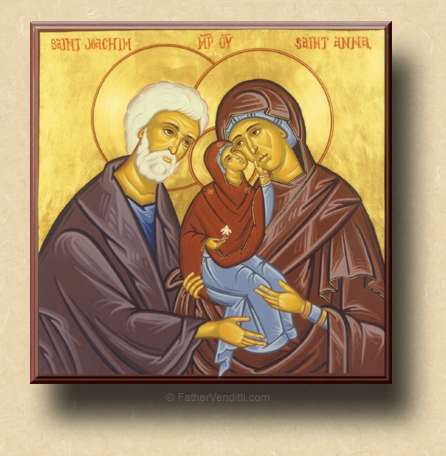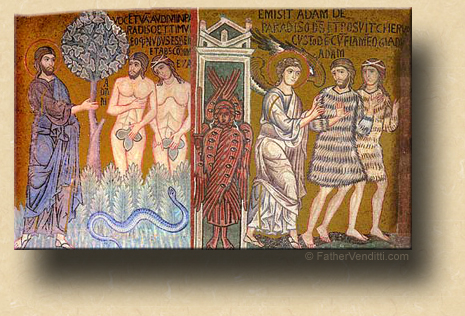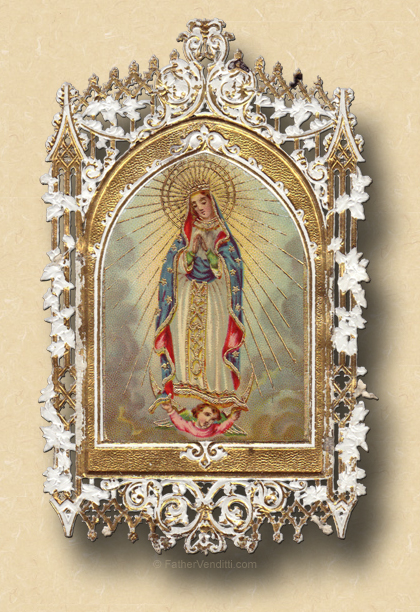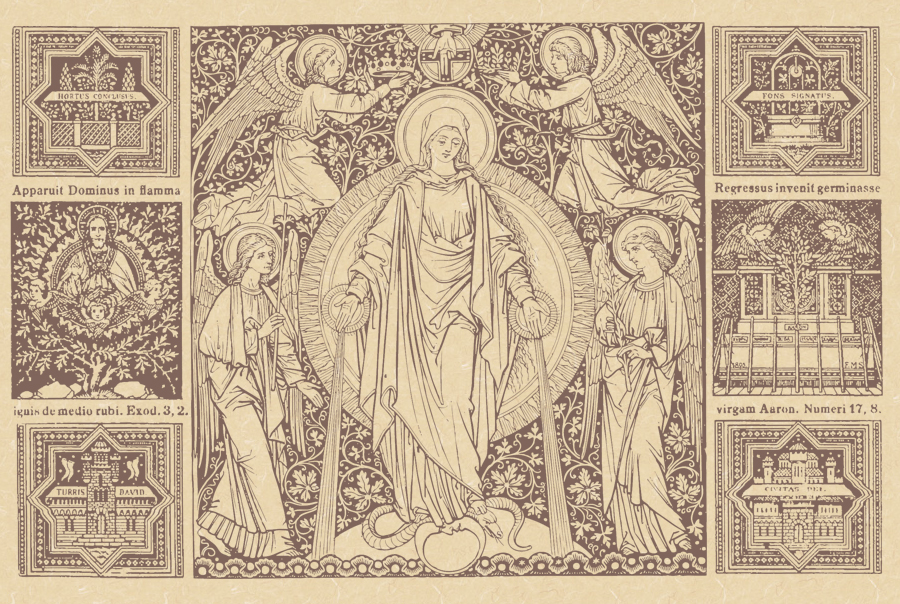Conceived Without What, Exactly?
The Solemnity of the Immaculate Conception of the Blessed Virgin Mary.
Lessons from the proper, according to the ordinary form of the Roman Rite:
• Genesis 3: 9-15, 20.
• Psalm 98: 1-4.
• Ephesians 1: 3-6, 11-12.
• Luke 1: 26-38.
The First Class Feast of the Immaculate Conception of the Blessed Virgin Mary; and, the Commemoration of the Second Tuesday of Advent.
Lessons from the proper, according to the extraordinary form of the Roman Rite:
• Proverbs 8: 22-35.
• [Gradual] Judith 13: 23.
• Luke 1: 26-28.
The Solemn Holy Day of the Maternity of the Holy Anna.
Lessons from the menaion, according to the Ruthenian recension of the Byzantine Rite:
• Galatians 4: 22-31.
• Luke 8: 16-21.
|
In jurisdictions where the Maternity of the Holy Anna is observed on December 9th:*
The Twenty-Eighth Tuesday after Pentecost; a Prefestive Day of the Maternity of the Holy Anna; and, the Feast of Our Venerable Father Patapius.
Lessons from the pentecostarion, according to the Ruthenian recension of the Byzantine Rite:
• Hebrews 4: 1-13.
• Luke 21: 12-19.
|
FatherVenditti.com
|
 9:44 AM 12/8/2015 — I presume that most of you have a rudimentary knowledge of messages our Blessed Mother delivered to the shepherd children at Fatima, and that you know something about that devotion, so close to our hearts here, which we call the devotion of the Five First Saturdays. Those five first Saturdays of the month, marked by confession, Mass and Holy Communion, are supposed to be observed in what our Blessed Mother called a spirit of reparation for five blasphemes which She had specified; and, the first of these was blasphemes against the Immaculate Conception. The Dogma has its roots in Sacred Scripture, was elucidated most eloquently by many Fathers of the Church,—particularly Saint John of Damascus, whose memorial we just celebrated the other day—mentioned by our Lady Herself at Lourdes, and finally proclaimed infallibly by Pope Blessed Pius IX in 1854. 9:44 AM 12/8/2015 — I presume that most of you have a rudimentary knowledge of messages our Blessed Mother delivered to the shepherd children at Fatima, and that you know something about that devotion, so close to our hearts here, which we call the devotion of the Five First Saturdays. Those five first Saturdays of the month, marked by confession, Mass and Holy Communion, are supposed to be observed in what our Blessed Mother called a spirit of reparation for five blasphemes which She had specified; and, the first of these was blasphemes against the Immaculate Conception. The Dogma has its roots in Sacred Scripture, was elucidated most eloquently by many Fathers of the Church,—particularly Saint John of Damascus, whose memorial we just celebrated the other day—mentioned by our Lady Herself at Lourdes, and finally proclaimed infallibly by Pope Blessed Pius IX in 1854.
But, how does one blaspheme against the Immaculate Conception? To answer that question, one must first know what the Immaculate Conception means; and, while everyone here is a faithful Catholic, bound by the decree of Pius IX to accept and believe it, how many of us, if asked, would be able to give a clear and concise definition of the dogma? At the conclusion of the Benediction of the Blessed Sacrament, we all pray with great self-assurance, speaking of the Mother of God: “Blessed be Her holy and Immaculate Conception”; we will do it again today in the Eucharistic Adoration we will have at the end of Mass commemorating the opening of the Jubilee Year of Mercy in Rome by Pope Francis. But when we say those words, are we clear about what it is we're saying?
Believe it or not, I've found—and perhaps you have, too—that many Catholics make the mistake of thinking the Immaculate Conception has something to do with the conception of our Blessed Lord in the womb of the Virgin Mary. But the Immaculate Conception does not refer to our Lord's miraculous conception in the incarnation; rather, it refers to the conception of Mary in the womb of Her mother, Saint Anne. In fact, in the Byzantine Church, where I served as a Catholic priest for many years, the feast of the Immaculate Conception is actually called the feast of the Maternity of the Holy Anna. Why is Anne's conception of the Blessed Virgin considered Immaculate? What exactly does that mean? After all, Anne's conception of our Blessed Mother was not miraculous, at least not as to how it came about. Unlike her Son, the Blessed Virgin Mary had a real human father; there was nothing supernatural about how She was physically conceived, and you need no explanation from me about how that process works.
The Mother of God was conceived in the normal way. The Immaculate Conception of the Blessed Virgin Mary does not mean that the physical act of her conception was miraculous in any way; unlike our Blessed Lord, who did not have a human father and whose Mother conceived Him without losing her virginity, the Blessed Virgin did have a human father, and Her mother, Anne, was not a virgin. What was miraculous about the conception of our Lady in the womb of Her mother, Anne, was not how it happened, but the fact that she was conceived without any stain of original sin. And here is where people's eyes start to gloss over and they get confused, because, even though every one of us here, being faithful Catholics, would all swear to a man (or woman) that we believe in the doctrine of Original Sin with all our hearts—after all, it's why we have our children baptized—we so often live our lives as if we don't believe it. Why does evil seem to always thrive in the world? Why do decadence and debauchery seem to hold sway over our society, lead our children astray, even temp and entice ourselves? Why have we stopped to wage the spiritual combat that came second nature to saints and martyrs of previous generations? Because we have forgotten our fallen nature. Because a misguided catechesis, born from a misinterpretation of a great ecumenical council, has fooled us into forgetting that we are born at war with the world.
So, to understand what it means to say that the Mother of God was conceived without Original Sin, we first have to understand what it means to say that everyone else is conceived with Original Sin, which means that we must understand what Original Sin is. What is Original Sin? I can give you the Baltimore Catechism answer, which many of you probably know:
Baltimore Catechism, original 1861 edition:
44. Q. What befell Adam and Eve on account of their sin? A. Adam and Eve on account of their sin lost innocence and holiness, and were doomed to misery and death.
45. Q. What evil befell us through the disobedience of our first parents? A. Through the disobedience of our first parents we all inherit their sin and punishment, as we should have shared in their happiness if they had remained faithful.
[…]
47. Q. What is the sin called which we inherit from our first parents? A. The sin which we inherit from our first parents is called original sin.
 We all had to memorize this stuff as kids. We didn't understand what it all meant at the time, but we weren't supposed to; we memorized it so that we would remember it after we had grown up, no longer under the influence of a nasty nun armed with a ruler, so that we could recall it as adults and live our lives by it. And for the most part, it worked. We all had to memorize this stuff as kids. We didn't understand what it all meant at the time, but we weren't supposed to; we memorized it so that we would remember it after we had grown up, no longer under the influence of a nasty nun armed with a ruler, so that we could recall it as adults and live our lives by it. And for the most part, it worked.
But then what happened? Some bright person comes along and decides that memorizing things isn't a good way to learn anymore, and it's wrong to wrap children on the knuckles when they get the answer wrong; that we need, instead, to keep telling our children how wonderful they are, and how special they are, and how much God loves them no matter how stupid they are; and gave them coloring books with Jesus blessing farm animals and taught them how to make the Holy Spirit out of balloons.
And there's the irony of it: we dutifully bring our children to be baptized because we know, instinctively, that they need to be baptized to be cleansed of Original Sin so that the gates of heaven can be opened for them; and, we can't, most of us, even say what Original Sin is.
So, let's say it now. What is Original Sin? In the Book of Genesis, man, who had been created in grace and in the image and likeness of his Creator, offends God and is stripped of sanctifying grace. What was the offense that man committed? He ate an apple. It wasn't because God was opposed to fruit. How is the tree in the Garden of Eden described? It is called the Tree of the Knowledge of Good and Evil. It's a metaphorical tree; the fruit on that tree symbolizes the authority of God to decide the difference between right and wrong: things are right and wrong, good and bad, because God says so. By eating the fruit off the Tree of the Knowledge of Good and Evil, man attempts to take that authority away from God and give it to himself, so that he, man, becomes the one to decide for himself what's right and what's wrong. That's why it's called the Original Sin: because all other sins are derived from it. Every sin that we can commit is basically the same: it reflects a desire on our part to decide for ourselves what's right and what's wrong. When Adam eats the fruit off the Tree of the Knowledge of Good and Evil, he's trying to become God. He is saying to God, “You will no longer tell me what's right and what's wrong; I'll do that for myself.” Every time we commit a sin, we are saying to God, “It's none of your business, God, to tell me that this is wrong. I have decided that it's right for me, so I will do it anyway.” We are trying to be God.
And even though the sacrament of baptism restores the grace lost by our first parents in the Original Sin, we are still infected with its effects, which is why, even after baptism, we are tempted, and we sin. It would be nice if baptism would simply restore everything to the way it was before the Original Sin was committed, but it doesn't work that way. We are rational creatures, created with a free and open will, which means that our souls, once robbed of Sanctifying Grace, while they can have that Grace restored to them, still suffer from the effects of having been deprived of it.
When I was nine years old, I came down with Scarlet Fever; and, even to this day, whenever I have a chest x-ray, I have to produce documentation to prove to everyone that I don't have cancer or something because the scar tissue on my lung is still clearly visible.  The Original Sin with which we are born scars our souls in just this way: that even when the disease of the sin is taken away by baptism, we still feel the symptoms of the disease. We are still tempted to sin. We are still subject to the whim of the devil. We do not enjoy the friendship that God had with Adam and Eve before the fall. The Original Sin with which we are born scars our souls in just this way: that even when the disease of the sin is taken away by baptism, we still feel the symptoms of the disease. We are still tempted to sin. We are still subject to the whim of the devil. We do not enjoy the friendship that God had with Adam and Eve before the fall.
Look at it this way: a dear friend of yours betrays you, or perhaps even your husband or your wife, and the two of you become estranged for a long period of time; then, you both come to your senses and, filled with love and forgiveness and Christian Charity, you make up and restore your friendship; but, in the back of your mind you know that you will never fully trust that person again. The relationship is restored, the friendship is resumed or the marriage is preserved, but it won't be exactly as it was before; it will always be damaged. Original Sin separates us from the friendship of God, and baptism restores that friendship; but, no matter how close to God we may become through prayer and the Grace of the Sacraments, we can never fully trust in God again. When we read the book of Genesis, and envy the relationship that Adam had with God before the fall, walking together side-by-side in the cool of the evening, we know we will never have that, just as Adam never had it again after he ate the apple, after he ate the fruit off the Tree of the Knowledge of Good and Evil. When God became a Man and died to pay for that sin, Adam, like the rest of us, had his disease cured; but, like the rest of us, he never had it exactly the way it was before because, even though the disease was cured, the scar never goes away.**
Which brings us back to the Immaculate Conception of the Blessed Virgin Mary in the womb of her own mother, Saint Anne. God cured the disease of the Original Sin by becoming a Man and dying a real death; but, to become a Man He had to have a mother; but, even as a Man, He's still God, which means that the mother who gives Him birth will be giving to Him her own flesh and blood. Which poses a problem: as Man, God must have a human mother, but as God, that human mother cannot have flesh that carries the scar of the disease of the Original Sin. So, what does God do? He prepares His way to earth by causing to be conceived, in the normal way, a Woman without the scar of the Original Sin: the only human person, besides Himself, ever conceived in this condition. The Immaculate Conception was necessary because Jesus is God.
The blasphemy, therefore, against the Immaculate Conception is denying that Jesus is God. The Protestants say, most of them, that Jesus is God; but, they deny the Immaculate Conception, claiming that they can't find it in the Bible. It's there, of course: it starts with the Book of Genesis and ends with birth of our Lord. It is impossible to deny the Immaculate Conception of the Blessed Virgin Mary and still believe that Jesus is God. In fact, when you think about it, a person who doesn't believe in the Immaculate Conception isn't really a Christian.
And, of course, it's not surprising that those who deny the Immaculate Conception of the Blessed Virgin Mary also deny the very existence of the Original Sin. Oh, they don't deny that Adam committed the sin; they just deny we carry the scars. This usually comes from taking a fundamentalist approach to the Bible, believing that there actually was an historical person named Adam, with an historical wife named Eve, who gave her husband an historical apple off of an historical tree that God, for some purely arbitrary reason, decided he didn't want anyone picking fruit from. The irony in all this is that people will fall into taking a fundamentalist approach to the Sacred Scriptures out of an exaggerated love and devotion for the Bible, but it's that very fundamentalist approach that ends up causing them to deny the basic truths of the faith that God inspired Moses to write the Book of Genesis to teach us.
So, during this Holy Mass for the Solemnity of the Immaculate Conception of the Mother of God, and the Eucharistic Adoration that follows, let us reaffirm our own certain faith that Her Son, Jesus Christ, is indeed, in human form, the one and only God.

* At no time was it universal practice in the East to observe this feast on the eighth, though today it is principally in Eastern Europe and Greece where one might find it celebrated on the ninth. No Churches of the Byzantine Tradition, Catholic nor Orthodox, have ever attached an obligation to it.
** J. R. R. Tolkien, a devout Catholic who wrote beautifully about the Blessed Sacrament and who translated the Book of Job for the English edition of The Jerusalem Bible, wrote his own metaphorical account of the history of salvation in his Lord of the Rings trilogy. The wound that Frodo receives from the sword of the wraith in The Fellowship of the Ring is cured by the magic of the elves, but never completely heals. As a consequence, he must struggle in The Two Towers to return the ring to its origins, i.e., restore his soul to a state of Sanctifying Grace, while all the forces of evil try to posses it. Though he is successful, the initial wound makes it impossible for him to remain in Middle Earth with his friends at the end of the saga and, in The Return of the King, is taken by the elves away from Middle Earth, presumably to purgatory, where his salvation is assured, but where he must first be purified.
|

